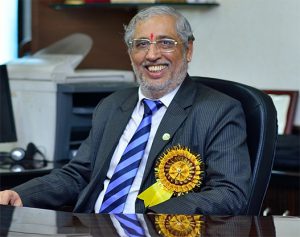Policymakers should work out innovative ways for future classrooms to function both physically and digitally, said Prof. Anil D Sahasrabudhe, Chairman, All India Council for Technical Education (AICTE) at AIMA’s Regional Management Conclave 2022.
The 2nd Plenary Session AIMA’s Regional Management Conclave 2022 on- ‘The Future Of Education’ was deliberated by Prof. Anil D Sahasrabudhe, Chairman, All India Council for Technical Education (AICTE).
A scholar and professor of Mechanical Engineering, well versed in Education Policies and well acquainted with the Laws of Mechanical Engineering, an institution builder by transforming and facilitating growth, Prof. Anil D Sahasrabudhe is also the transformer of Education, and he was very much qualified to deliberate the Session.
Education in India began as a private initiative but was regulated by the State. The compulsions and economic development and the involvement of politics have only changed the landscape of Education over the years. The disruptions in quick succession have only added more to shape Education.
Prof. Anil D Sahasrabudhe started on a very delightful note by explaining the evolution of Education in India, where pupils used to go to a forest in order to receive Education from a teacher who resided there. And that scenario progressed to students getting admission to schools.
The next stage involved educating students with the help of projectors, moving on to also taking the help of computers. There is also a concept of Distance Education adhered to by many. Education can also be received from YouTube lectures. And now, education can be imparted through Zoom.
Besides, every state also has an Open University. Education has also been specialised over the years, one can enroll in a specialised course of any subject/category. Like any other aspect of life, Education has also undergone torments of the VUCA (volatility, uncertainty, complexity, ambiguity) World and only emerged stronger.
The Covid pandemic, for that matter, was an eye-opener for the world to witness the power of education. The creation of vaccines and the innovation in businesses to adapt to the new environment was the outcome of the education received by the creators and innovators.
Education at that time went a complete overhaul but did not come to halt. Online Education bridged the gap in physical attendance for students but education continued and students still got educated. And it was the uncertainty of the pandemic that paved way for many innovations in education that have been included in the National Education Policy now.
The impact of technology on the dissemination of knowledge is the knowledge you need for education, which is freely available on the Internet. A huge amount of information and research is available on different platforms for students to take advantage of.
The teachers and students all got used to the Online Form of Education. However, Blended Learning or Hybrid Learning is also a part of the new Education Policy, with some parts of the education happening in the classroom and some online.
Many institutions are also adopting the Remote Control Experiment where some experiments are conducted with the remote technique. The Finance Minister has already announced for Digital Universities to be operational.
The new Education Policy allows you to mix and match courses from different universities and colleges. It also allows you the flexibility of choosing the duration of the Course of your choice, where you can opt-out of the Programme and again come back and complete the same, he said.
Prof. Anil D Sahasrabudhe also spoke about the Faculty Development Programme as part of the Education Policy, where the teachers are being prepared for a new framework of education; to strengthen their skill set, get exposure to new educational techniques, and more.
Finally, he said that the process of learning never stops. One should become a lifelong learner, and that has to come from the teachers. If the teachers set an example, the students are prone to follow suit. The spirit of education should always prevail; inquisitiveness for innovations, awareness of worldly challenges, and making good use of technology.
Watch the full Session- https://www.youtube.com/watch?v=ZxZ_dwBeh-M




